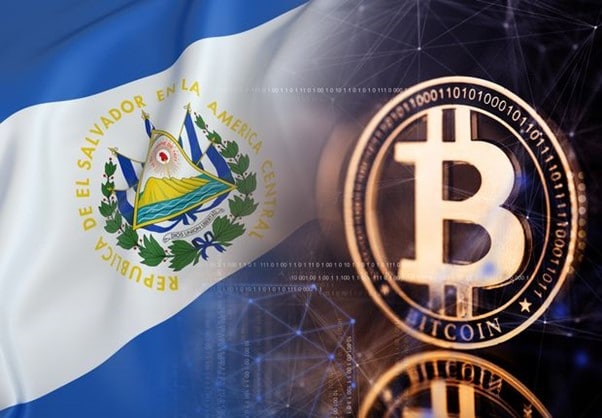- Accounts
- About
- Trading
- Platforms
- Tools
- News & education
- News & education
- News & analysis
- Education hub
- Economic calendar
News & Analysis
Bitcoin’s first official legal tender
4 February 2022On June 5th 2021, El Salvador President Nayib Bukele declared that Bitcoin, the first cryptocurrency, would become legal tender in El Salvador. A few days later, the Bitcoin Law was passed, to take effect September 7th 2021. Businesses would be required to accept Bitcoin for all payments. Salvadorians would need to apply for a digital wallet called “Chivo” which is slang in El Salvador and translates to “Cool”.

El Salvador also has even bigger plans, which include to build a Bitcoin city at the base of a volcano, with the cryptocurrency used to fund the project, its president has announced. The city will be circular to represent the shape of a large coin and will be built in the south-eastern region of La Unión, President Nayib Bukele said on 21st November 2021.
This is fairly ambitions and it remains to be seen if it will be a success. With Bitcoin City, El Salvador plans to usher in a new era of digital education, sustainable energy reserves, and green mining. When the city becomes a reality, it will aim to achieve zero CO2 emissions and become a Bitcoin mining ecosystem driven by geothermal energy.
Panama’s move towards bitcoin adoption occurred on the same day that El Salvador became the first country to accept bitcoin as legal tender. The country is adding its own unique stamp to the process by accepting other cryptocurrencies including Ethereum. Other countries are also considering ways of integrating Cryptocurrencies into their paying systems. How and when? These are burning questions that all Crypto investors and holders of Crypto want to know.
The International Monetary Fund (IMF) has its say
The IMF’s mandate includes facilitating the expansion and balanced growth of international trade, promoting exchange stability, and providing the opportunity for the orderly correction of countries’ balance of payments problems. However, it splits opinion, as some regard them as having too much say in countries to whom they provide financial aid. Some critics say the conditions the IMF attaches to its loans are too harsh and have harmed developing countries.
It has been reported that on the 25th January 2022, The IMF has published on their website a 114-page report advising El Salvador. The board’s directors have now “urged the authorities to narrow the scope of the Bitcoin law by removing Bitcoin’s legal tender status”, according to a statement. They highlighted the “large risks associated with the use of Bitcoin on financial stability, financial integrity and consumer protection” and with issuing Bitcoin-backed bonds. The International Monetary Fund urged that El Salvador should dissolve the $150 million trust fund it created when it made the cryptocurrency Bitcoin legal tender and return any of those unused funds to its treasury.
The response so far has been emphatic, The El Salvador’s Finance Minister Alejandro Zelaya told a local television station that bitcoin is an issue of “sovereignty.” According to the media, he “angrily” said: “No international organization is going to make us do anything, anything at all.”
“Countries are sovereign nations, and they take sovereign decisions about public policy,” the finance minister added.
For now at least, Bitcoin stays legal tender. Rightly, there’s always going to be some upheaval with such a disruptive technology being thrusted upon the community, especially from those with little understanding of its concepts. Regulation will need to fair and swift before any institutional investors part with their money, although, is not to say there hasn’t been huge movements in the private sector as it is. Companies such as Tesla and MicroStrategy are a few already holding Bitcoin on their balance sheets. Here are the others.
One of various ways to trade this asset, is by using CFDs (Contracts for Differences). It allows you to trade the value or price (the underlying asset) of the BTCUSD pair, without owning it. Providing the ability to hold a position, without having in your balance the full cost of a Bitcoin, which at the time of writing sits at $38,295 USD ($53,698 AUD). More information can be found here on how to open an account.
Sources: Google, Decrypt, Economic Times Indiatimes.com, Tradingview.com, International Monetary Fund, Bitcoin.com, Wikipedia
Disclaimer: Articles are from GO Markets analysts and contributors and are based on their independent analysis or personal experiences. Views, opinions or trading styles expressed are their own, and should not be taken as either representative of or shared by GO Markets. Advice, if any, is of a ‘general’ nature and not based on your personal objectives, financial situation or needs. Consider how appropriate the advice, if any, is to your objectives, financial situation and needs, before acting on the advice. If the advice relates to acquiring a particular financial product, you should obtain and consider the Product Disclosure Statement (PDS) and Financial Services Guide (FSG) for that product before making any decisions.
Next Article
Amazon Q4 financial results are in
Amazon.com (AMZN) announced its fourth quarter results after the closing bell on Thursday. The company reported total revenue of $137.412 billion (9% increase vs. the same period in 2020) in the previous quarter, which was just shy of analyst forecast of $137.682 billion. Earnings per share reported at $27.75, above analyst forecast of $3.61 ...
February 4, 2022
Read More >
Previous Article
Meta fourth quarter numbers are in
Meta Platforms (FB) reported its fourth quarter financial numbers after the closing bell on Wall Street on Wednesday. The company reported total re...
February 3, 2022
Read More >

